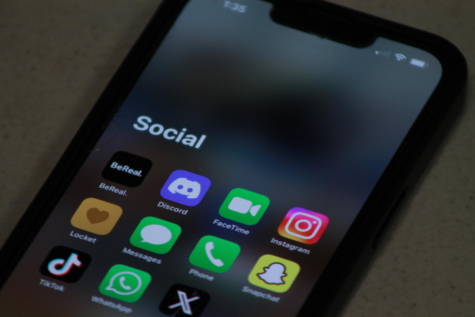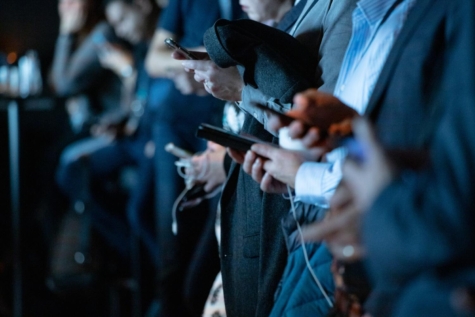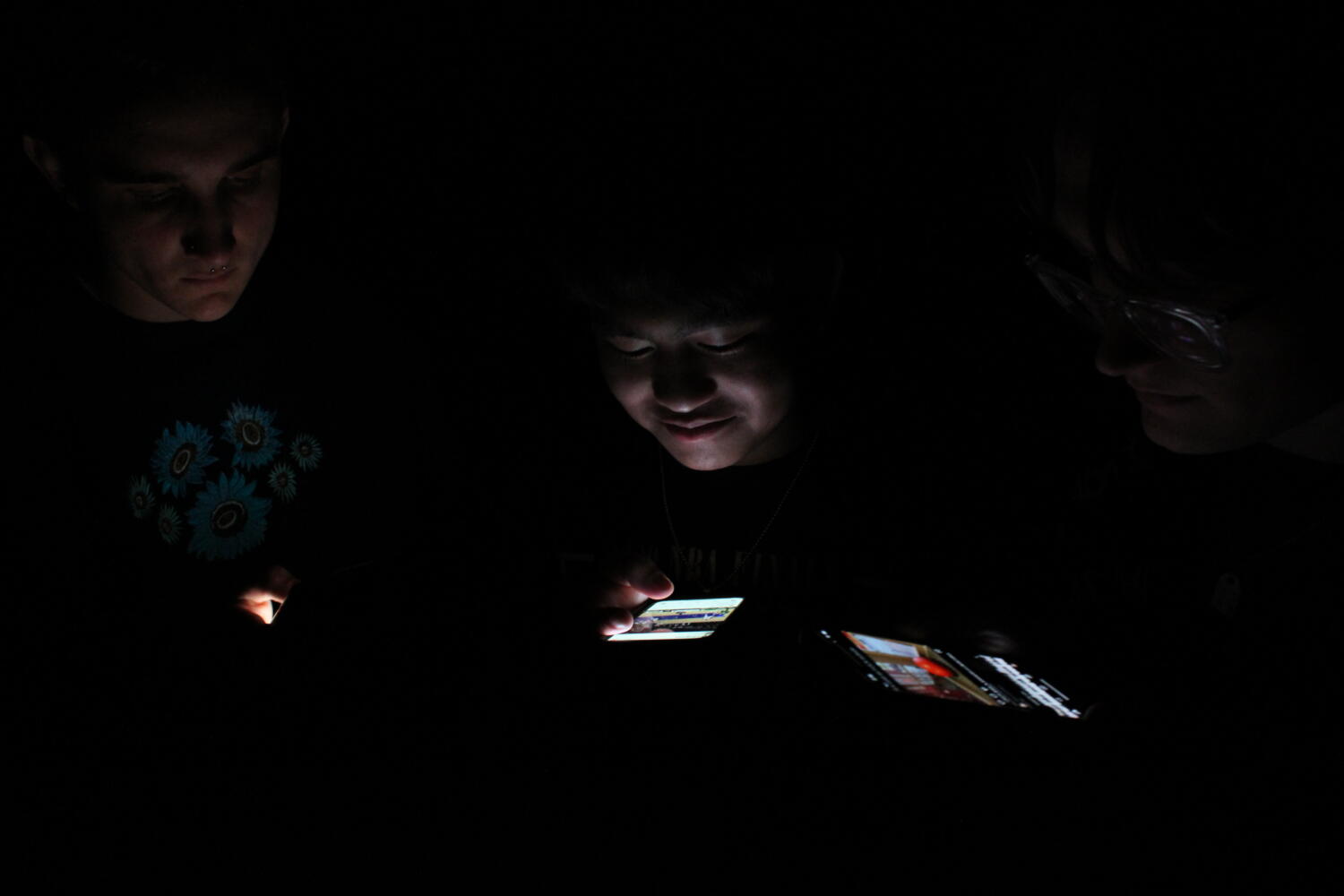What are the effects of social media use? Are they negative, or positive? In the past decade, it has become an increasingly substantial part of our lives. Many spend hours every day scrolling through their phone looking at Instagram or Twitter. But how is this affecting our mental health? And how does it affect students, more specifically?
The answer to that question is not so simple. Many think it has overtly negative effects on our body image and self-esteem, among other ramifications. The majority of Americans, 64%, think that social media has had a negative effect on the U.S. Some, however, have recognized that social media benefits our sense of community. It can connect us through an online medium, sometimes in ways we never could before.
A Time Challenger

How can we avoid the negative effects of social media? Things like anxiety, body dysmorphia, and cyberbullying are all issues that can be associated with it.
The answer, according to some mental health professionals, is to moderate our usage to less time per day. The time may vary from person to person, but generally around 30 minutes a day is a healthy dose.
But how do we know when social media is affecting us negatively? Anna Ortega-Nieto, a counselor at Sierra College, gave insight into why she thinks social media may be affecting us negatively:
“If it’s taking too much of my time, if it’s starting to affect the things that I need to be doing… that’s when we have to take a step back and say ‘Okay, I do need to put some limits around this.’”
Social media may also be affecting our productivity. TikTok, Instagram, and Twitter all use an endless scrolling format that can leave you staring at your screen for hours. This might become a problem for the younger generation, with some students who could end up spending more time on their phones than their studies.
Social Media & School
Students who use social media daily have been correlated with lower scores on tests than those who don’t use social media at all. Is this to say that students should not use social media at all? Of course not. While social media has been shown to have adverse effects on students, its positive effects cannot be ignored.
Educational institutions have accepted student use of social media. Social media accounts are being used by administrators at schools across the U.S. High schools, middle schools, colleges, and sometimes even elementary schools are using it to inform students and parents alike.
It can also be a way to teach and learn. When asked if social media had any positive outcomes in her professional view, Ortega-Nieta said:
“If someone’s trying to learn things in a different way, or maybe they want additional support, then it does open the door that now they have that opportunity to have all these different ways of learning that we didn’t have in the past.” She explained, “It’s interesting because not everyone can attend in-person classes… When we use social media intentionally and we use it as a way to connect or as a way to learn, then I think it does support the learning of students who may not be able to physically attend campus,” she said.
Positive or Negative? Students Say Both
On October 26th, I interviewed a group of 5 students outside the library of the Sierra College Rocklin campus. I asked them how they felt social media was affecting their lives, and whether it had a positive or negative effect. Most said, “both.” One of the students, Emmanuel, said that he sees it as a “metaphor for communication.” He explained:
“People can bond with others through it. But I feel like it also creates a separation because it is a metaphor for communication. It’s not real.”
Another student in the group, J.J., added:
“For Generation Z, we’re born into this world with two lives. We have our physical life, and then we have how we present ourselves online. So we have a whole separate character.”
Similarly, Serene, whom I interviewed by the B Building on the same day, said: “There’s all this really great stuff you can access… But people can compare each other and the problem with social media is that you get to pick what you put out. So it’s not really an accurate depiction of anyone’s life.”
A Bad Reputation
So why does 64% of the population think that social media is having a net negative effect on us? Why do we use it when it has such a bad reputation? What is it about social media that makes it so desirable?
Serene said,
“I think it’s really scary because it’s super polarizing. ”
However, she still thought it should be recognized that the effects of social media has its benefits. “I would say a net positive [the impact of social media]… It’s a good way to communicate with others, I’ve learned a lot about art and cooking and all the things that are on social media. I would be able to connect with significantly less people if it weren’t for social media,” she said.

“It can be something that can be a downfall to you trying to be productive, or it can be something that, in the right context, lifts you up and can really help you communicate effectively, or do media and advertising for a brand or business,” said J.J.
Social media is designed to be addictive. Using social media can cause your brain to release dopamine, the brain’s “reward system”. We want to connect with others, and it gives us that opportunity at our fingertips, something we haven’t had until recently. But its addictive design is part of what makes it so desirable, and we have to be careful in how we use it.
A study found that time on Facebook has been linked to an increase in anxiety and depression. Because social media use has been correlated with worse mental health, it’s problematic that social media is being designed to keep you on the website/app for as long as possible. Because of this, it’s understandable why social media tends to be viewed negatively.
What Can We Do?
Social media is not all bad. But still, it’s also certainly not all good either. It’s important for us to figure out what the good is and what the bad is, and how we can use it to our advantage instead of it taking advantage of us.
Using social media too often can lead to a decline in mental health. However, not using social media at all can leave some of its benefits on the table. For example, the ability to talk to people you know at any time, without needing their phone number.
Ortega-Nieto says that the first thing to be looking out for is to be aware of whether social media is affecting you:
“If someone is genuinely struggling with their mental health, seeking help is important. Because through that process, one can gain support and strategies. And that may be as simple as ‘I’m going to limit the amount of social media’ or ‘the times of day I’m going to use social media’. Like for example, for the last two or three hours of the day before I go to bed, I’m not going to go online, I’m actually going to do something more intentional. Maybe I’m going to meditate, maybe I’m going to read or journal, or talk to a family or friend.”
She also noted that the changes a person can make can vary from person to person. What works for one person may not work for another. The most important thing is to seek help if you need it and to recognize that you may have an addiction or a problem with social media.
A Double-Edged Sword
The effects of social media can be a double-edged sword. Sometimes it has positive effects. Sometimes it has negative effects.
As humans, we want to connect. Social media provides us with a way to connect in any space with just the click of a few buttons. With over half the world logged into social media, it won’t be going away any time soon. Instead of trying to get rid of it, it’s for the best that we try to find a solution to the negative things it’s doing to our mental well-being and academic and professional success.
Social media allows us to connect with friends: show the best part of ourselves, spread a positive message, and learn new things in ways that were not possible before. But it also can adversely affect our mental health, with things like body dysmorphia, cyberbullying, or anxiety.
To keep our mental health on track, we can monitor how much time we spend on it so it doesn’t get in the way of the rest of our lives. Ortega-Nieto said that if you feel like you are spending too much time on social media, something tangible helps: “I’m limiting, I’m turning off, or putting blockers on social media…” She offered a question for us to ask ourselves when we organize our time on social media and offline: what are things that I can do for myself that bring me joy?
There are more ways we can connect than ever before. Our challenge now is to decide how we can use social media to benefit our time and find the things that bring us happiness.
Written and Reported by Jackson Lindstrom | Featured photo by Amanda Marie




